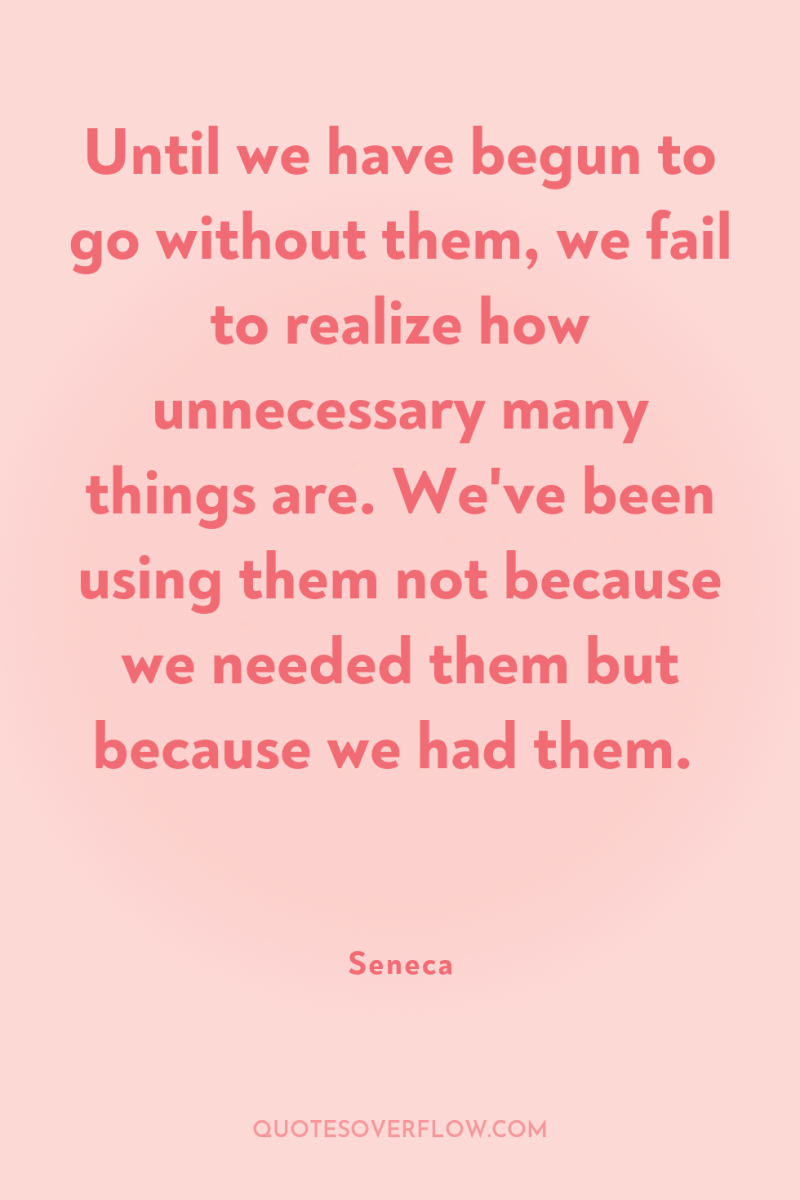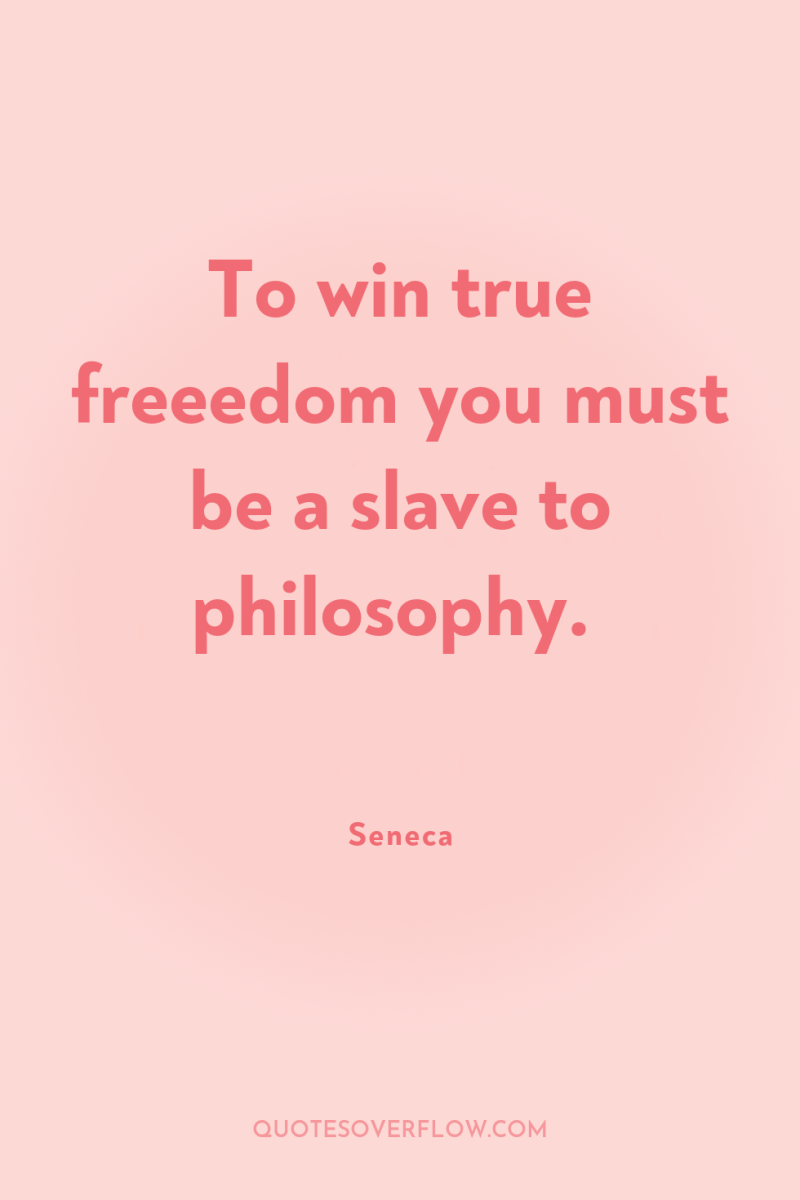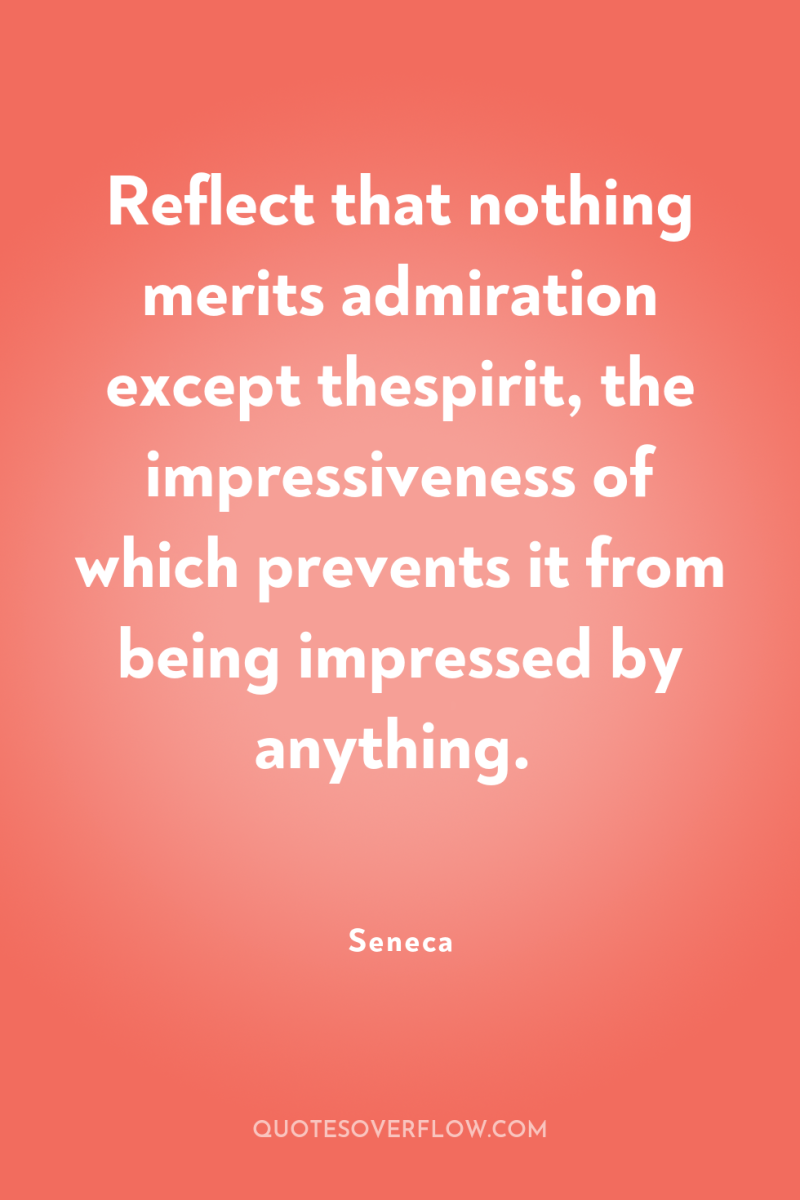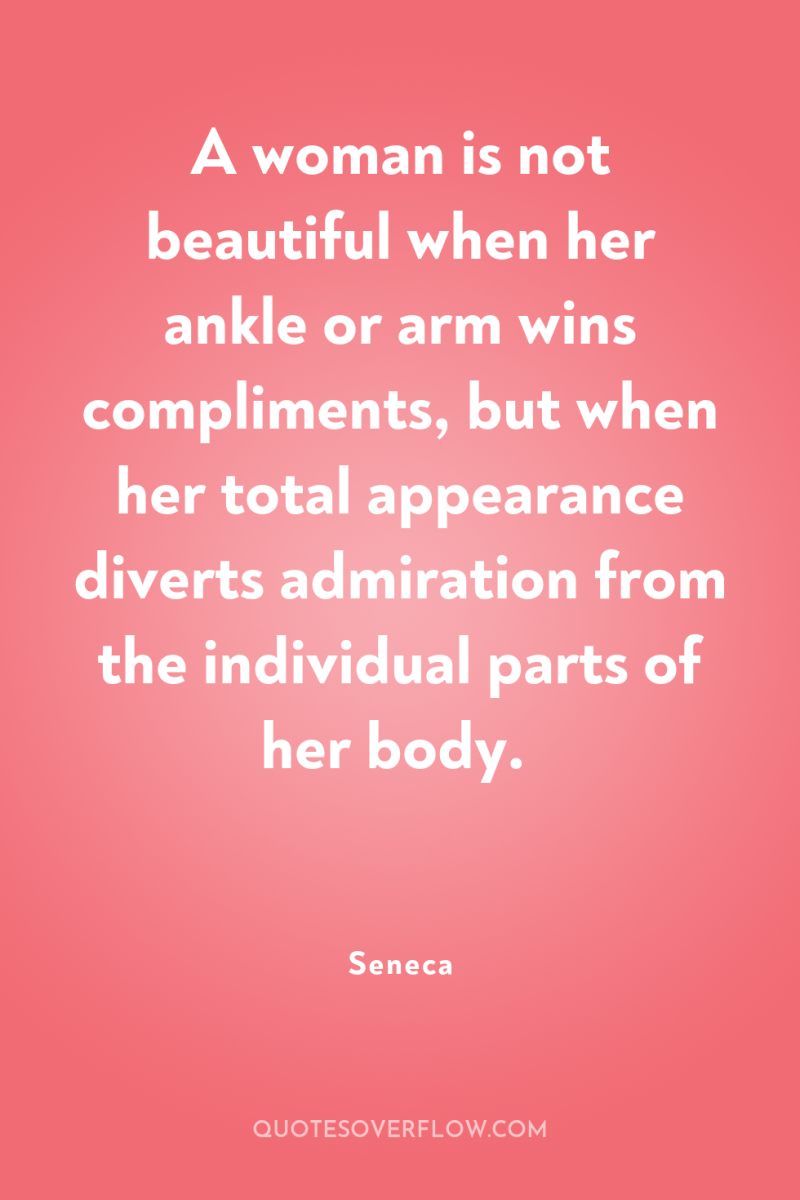
1
Until we have begun to go without them, we fail to realize how unnecessary many things are. We've been using them not because we needed them but because we had them.Seneca

2
To win true freeedom you must be a slave to philosophy.Seneca
3
Each day acquire something that will fortify you against poverty, against death, indeed against other misfortunes as well; and after you have run over many thoughts, select one to be thoroughly digested that day.Seneca
4
That you would not anticipate misery since the evils you dread as coming upon you may perhaps never reach you at least they are not yet come Thus some things torture us more than they ought, some before they ought and some which ought never to torture us at all. We heighten our pain either by presupposing a cause or anticipationSeneca
5
They Whatever can make life truly happy is absolutely good in its own right because it cannot be warped into evil From whence then comes error In that while all men wish for a happy life they mistake the means for the thing itself and while they fancy themselves in pursuit of it they are flying from it for when the sum of happiness consists in solid tranquillity and an unembarrassed confidence therein they are ever collecting causes of disquiet and not only carry burthens but drag them painfully along through the rugged and deceitful path of life so that they still withdraw themselves from the good effect proposed the more pains they take the more business they have upon their hands instead of advancing they are retrograde and as it happens in a labyrinth their very speed puzzles and confounds them .Seneca
6
We deceive ourselves in thinking that death only follows life whereas it both goes before and will follow after it for where is the difference in not beginning or ceasing to exist the effect of both is not to beSeneca
7
Consider the whole world reconnoitre individuals j who is there whose life is not taken up with providing for to morrow Do you ask what harm there is in this An infinite deal for such men do not live but are about to live they defer every thing from day to day however circumspect we are life will still outrun us.Seneca

8
Believe me if you consult philosophy she will persuade you not to lit so long at your counting deskSeneca

9
I have learned to be a friend to myself Great improvement this indeed Such a one can never be said to be alone for know that he who is a friend to himself is a friend to all mankindSeneca
10
You shall be told what pleased me to-day in the writings of Hecato; it is these words: "What progress, you ask, have I made? I have begun to be a friend to myself." That wasindeed a great benefit; such a person can never be alone. You may be sure that such a man is a friend to all mankind.Seneca
11
[I]ndulge the body just so far as suffices for good health. It needs to be treated somewhat strictly to prevent it from being disobedient to the spirit. Your food should appease your hunger, your drink quench your thirst, your clothing keep out the cold, your house be a protection against inclement weather.Seneca

12
Reflect that nothing merits admiration except thespirit, the impressiveness of which prevents it from being impressed by anything.Seneca
13
What mancan you show me who places any value on his time, who reckons the worth of each day, who understands that he isdying daily? For we are mistaken when we look forward to death; the major portion of death has already passed, Whatever years be behind us are in death's hands.Seneca

14
There is no enjoying the possession of anything valuable unless one has someone to share it withSeneca

15
Because thou writest me often, I thank thee ... Never do I receive a letter from thee, but immediately we are together.Seneca

16
A woman is not beautiful when her ankle or arm wins compliments, but when her total appearance diverts admiration from the individual parts of her body.Seneca
17
Words need to be sown like seeds. No matter how tiny a seed may be, when in lands in the right sort of ground it unfolds its strength and from being minute expands and grows to a massive size.Seneca
18
If you really want to escape the things that harass you, what you’re needing is not to be in a different place but to be a different person.Seneca
19
All this hurrying from place to place won’t bring you any relief, for you’re traveling in the company of your own emotions, followed by your troubles all the way.Seneca
20
The trip doesn’t exist that can set you beyond the reach of cravings, fits of temper, or fears … so long as you carry the sources of your troubles about with you, those troubles will continue to harass and plague you wherever you wander on land or on sea. Does it surprise you that running away doesn’t do you any good? The things you’re running away from are with you all the time.Seneca
21
So long, in fact, as you remain in ignorance of what to aim at and what to avoid, what is essential and what is superfluous, what is upright or honorable conduct and what is not, it will not be travelling but drifting. All this hurrying from place to place won’t bring you any relief, for you’re travelling in the company of your own emotions, followed by your troubles all the way.Seneca
22
Once you have rid yourself of the affliction there, though, every change of scene will become a pleasure. You may be banished to the ends of the earth, and yet in whatever outlandish corner of the world you may find yourself stationed, you will find that place, whatever it may be like, a hospitable home. Where you arrive does not matter so much as what sort of person you are when you arrive there.Seneca
23
The man who spends his time choosing one resort after another in a hunt for peace and quiet will in every place he visits find something to prevent him from relaxing.Seneca
24
If you look on wealth as a thing to be valued your imaginary poverty will cause you torment.Seneca
25
The shortest route to wealth is the contempt of wealth.Seneca
26
For many men, the acquisition of wealth does not end their troubles, it only changes themSeneca
27
There are more things, Lucilius, likely to frighten us than there are to crush us; we suffer more often in imagination than in reality.Seneca
28
However much you possess there's someone else who has more, and you'll be fancying yourself to be short of things you need to exact extent to which you lag behind him.Seneca
29
For Fate/ The willing leads, the unwilling drags along.Seneca
30
[Philosophers] have come to envy the philologist and the mathematician, and they have taken over all the inessential elements in those studies–with the result that they know more about devoting care and attention to their speech than about devoting such attention to their lives.Seneca
31
Count your years and you'll be ashamed to be wanting and working for exactly the same things as you wanted when you were a boy. Of this one thing make sure against your dying day - that your faults die before you do. Have done with those unsettled pleasures, which cost one dear - they do one harm after they're past and gone, not merely when they're in prospect. Even when they're over, pleasures of a depraved nature are apt to carry feelings of dissatisfaction, in the same way as a criminal's anxiety doesn't end with the commission of the crime, even if it's undetected at the time. Such pleasures are insubstantial and unreliable; even if they don't do one any harm, they're fleeting in character. Look around for some enduring good instead. And nothing answers this description except what the spirit discovers for itself within itself. A good character is the only guarantee of everlasting, carefree happiness. Even if some obstacle to this comes on the scene, its appearance is only to be compared to that of clouds which drift in front of the sun without ever defeating its light.Seneca
32
The road is long if one proceeds by way of precepts but short and effectual if by way of personal example.Seneca
33
Preserve a sense of proportion in your attitude to everything that pleases you, and make the most of them while they are at their best.Seneca
34
Reason shows us there is nothing either good or bad but thinking makes it so.Seneca
35
But nothing will help quite so much as just keeping quiet, talking with other people as little as possible, with yourself as much as possible. For conversation has a kind of charm about it, an insinuating and insidious something that elicits secrets from us just like love or liquor. Nobody will keep the things he hears to himself, and nobody will repeat just what he hears and no more. Neither will anyone who has failed to keep a story to himself keep the name of his informant to himself. Every person without exception has someone to whom he confides everything that is confided to himself. Even supposing he puts some guard in his garrulous tongue and is content with a single pair of ears, he will still be the creator of a host of later listeners — such is the way in which what was but a little while before a secret becomes common rumor.Seneca
36
A guilty person sometimes has the luck to escape detection, but never to feel sure of it.Seneca
37
And do you know why we have not the power to attain this Stoic ideal? It is because we refuse to believe in our power. Nay, of a surety, there is something else which plays a part: it is because we are in love with our vices; we uphold them and prefer to make excuses for them rather than shake them off. We mortals have been endowed with sufficient strength by nature, if only we use this strength, if only we concentrate our powers and rouse them all to help us or at least not to hinder us. The reason is unwillingness, the excuse, inability. .Seneca
38
Let us cherish and love old age; for it is full of pleasure if one knows how to use it. Fruits are most welcome when almost over; youth is most charming at its close; the last drink delights the toper, the glass which souses him and puts the finishing touch on his drunkenness. Each pleasure reserves to the end the greatest delights which it contains. Life is most delightful when it is on the downward slope, but has not yet reached the abrupt decline. .Seneca
39
Those who wish their virtue to be advertised are not striving for virtue but for renown. Are you not willing to be just without being renowned? Nay, indeed you must often be just and be at the same time disgraced. And then, if you are wise, let ill repute, well won, be a delight. Farewell.Seneca
40
Barley porridge, or a crust of barley bread, and water do not make a very cheerful diet, but nothing gives one keener pleasure than having the ability to derive pleasure even from that-- and the feeling of having arrived at something which one cannot be deprived of by any unjust stroke of fortune.Seneca
41
Cling, therefore, to this sound and wholesome plan of life; indulge the body just so far as suffices for good health.. Your food should appease your hunger, your drink quench your thirst, your clothing keep out the cold, your house be a protection against inclement weather. It makes no difference whether it is built of turf or variegated marble imported from another country: what you have to understand is that thatch makes a person just as good a roof as gold.Seneca
42
Spurn everything that is added by way of decoration and display by unneccesary labour. Relect that nothing merits admiration except the spirit, the impressiveness of which prevents it from being impressed by anything.Seneca
43
To expel hunger and thirst there is no necessity of sitting in a palace and submitting to the supercilious brow and contumelious favour of the rich and great there is no necessity of sailing upon the deep or of following the camp What nature wants is every where to be found and attainable without much difficulty whereas require the sweat of the brow for these we are obliged to dress anew j compelled to grow old in the field and driven to foreign mores A sufficiency is always at hand .Seneca
44
Desultory reading is delightful, but to be beneficial, our reading must be carefully directed.Seneca